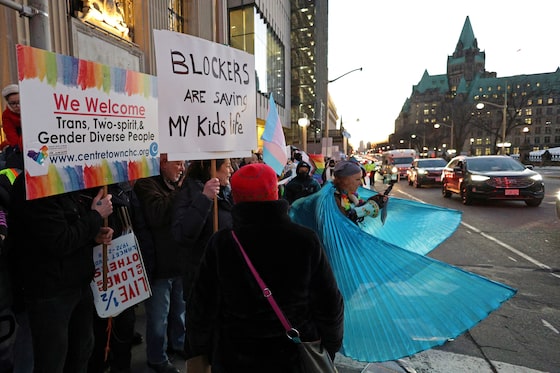
LGBT rights supporters protest against a visit by Alberta Premier Danielle Smith at Parliament Hill in Ottawa, on Feb. 5.ISMAIL SHAKIL/Reuters
Kai Cheng Thom is a writer and sex educator in Toronto.
The first out trans person I ever met was a young woman named January. She was sitting in the lounge of Vancouver’s Qmunity Centre (which was simply called “The Centre” at the time) on my first visit there. I was a closeted teenager at the time. Though I never got to know January very well, her warmth, beauty, and the sound of the gold bangles she wore are etched deeply into my memory and coming-out story. Meeting January at that desperate moment in my life gave me hope – a vision of possibility.
January was killed in 2012, in an act of violence that her loved ones believe was motivated at least in part by her trans identity. January was neither the first nor last trans woman in my community to die under violent or mysterious circumstances: Many trans people in Canada remember Shelby Tom, Cassandra Do, Sisi Thibert, Alloura Wells, Sumaya Dalmar and Julie Berman, all of whom suffered similar fates.
Though the mid-2010s were dubbed the “transgender tipping point” due to significant shifts in public awareness of trans rights, it is impossible for most of us who lived through that shift to forget what it was like to live in a society where hatred and revulsion toward trans people was the norm. This was a society where the climactic scene of a hit children’s movie involved Jim Carrey violently ripping the clothes off of a trans woman character while everyone around her vomits in response – all considered good family fun by mainstream audiences. I suppose that for some people, the “trans rights” movement sprang up overnight in 2015 – but for people like me, it has been the outgrowth of decades of trying to be recognized as human beings.
Perhaps this is why Alberta Premier Danielle Smith’s recent announcement that her government is adopting policies restricting gender-affirming care for trans youth has been hailed as a “voice of sanity,” “caring and reasonable,” and “quite sensible” in conservative Canadian media, while leading queer and trans rights organizations have declared those same policies to be draconian, harmful and anti-evidence. It’s clear that many Canadians are worried about trans issues, especially health care for gender-diverse children, so civil discourse on these matters is indeed called for.
Yet honest dialogue on trans rights must account for historic and present-day transphobia in mainstream culture – a context that many “gender-critical” individuals seem to be either unaware of or ignoring. Take the history of pediatric care for gender-diverse children, for example: The gender-affirming model that we have today didn’t emerge from a vacuum. It evolved in response to the fact that, for much of the 20th century, the predominant medical approach to gender nonconformity in children was to discourage transition, discourage homosexuality and encourage gender conformity. Decades of research and scientific debate on this topic gave way to the affirming model, because the individuals who experienced the traditional models of care were largely not helped, and in some cases, harmed.
Reasonable discussion and reasonable law-making should account for this history. The Alberta government seems to think it knows more than Alberta’s own medical association in adopting its new policies, so does it have a plan to prevent the harms of the past? Or could it be that there are more political motivations at play?
It’s no secret that anti-trans sentiment has been whipped into a frenzy over the past few years, and frankly, what’s unreasonable is for politicians and journalists to pretend this is all about civil debate. The fact is that a significant part of the “gender-critical” movement is uncomfortable with trans people as a concept, which is unsurprising since much of the past century has been steeped in a moral panic that associates trans people with pedophilic abuse.
The briefest of searches into “gender-critical” discourse causes the veneer of “reasonableness” to dissolve. Recently, non-binary performer Alok Vaid-Menon gave a talk – presumably by invitation – at the Lesbians Who Tech conference, and as a result has been attacked by hundreds of gender-critical individuals online calling Vaid-Menon “grotesque,” a “freak weirdo,” and a “hideous pervert,” among other epithets. In 2022, prominent gender-critical author Helen Joyce said in an interview that the number of people who transition should be reduced, as “every one of those people is … a huge problem to a sane world.”
There are certainly important, and uncomfortable, conversations to be had regarding trans rights and their limits. Yet no such conversation has integrity without recognition of the trans community, trans culture, and the history of discrimination we have survived – and that some of us didn’t. Civil dialogue is essential if we are ever to solve the culture war on gender. Let’s start by acknowledging that all of us deserve a place in the world.



